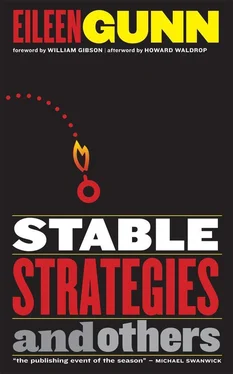All the needles on the mysterious gauges twitched to the right.
“Holy cow,” Bob said. It wasn’t what he had intended to say.
“Someone has switched on the Tesla coils!” Hopper slammed her hand against the bulkhead.
There was a brief, terrible shriek.
Kobinski burst open the door. “What,” the sailor asked, his voice breaking, “the fuck was that? ”
“It sounded like voices,” Asimov said.
Bob nodded. “Dozens of voices.”
“Cut off,” Grace Hopper said, “in mid-scream.”
They turned as one and ran down the passageway. Bob was just behind Kobinski, the other two lagging after. He plunged through a hatchway, misjudged the height, and banged his head.
“ Damn! ” Bob staggered and clutched his temple.
Asimov and Hopper rounded the corner, almost colliding with him. Bob straightened.
Kobinski was nowhere to be seen.
Nor could he hear the sound of running feet.
Hopper was the first to speak. “Where did he go?”
Bob looked right and left, hoping to see a swinging door, a vibrating ladder, anything that might explain the sailor’s disappearance. Nothing. Involuntarily, he thought of the Mary Celeste , the ladle in the galley swinging to and fro above the bubbling stew pot. He felt an abrupt nausea, and was suddenly unsure of his footing. He tried to brace himself, failed, and looked down.
Where his feet met the deck, the steel plating was turning misty, uncertain, translucent. Bob’s feet were sinking into the deck.
Grace saw Heinlein begin to slip into the mist and shouted “Grab him!” She seized an elbow and Asimov flung his arms around Heinlein’s chest and they both pulled. With a hissing sound, Heinlein came free of the grey ooze. All three staggered backward.
Grace stooped to probe with a pencil the gray-green indeterminacy where Heinlein had begun to sink into the floor. She was careful to keep her fingers out of it.
“Bob, are you all right?” Are you all right?” Asimov shouted. He was a milksop, Grace thought. A city boy. A civilian.
Heinlein shouted something back. Grace wasn’t listening. All her attention was on the gray-green mist. At first, it had the viscosity of molasses, but in just seconds, it solidified. When she tried to draw back the pencil, it wouldn’t budge. She twisted it, trying to leverage it out and it snapped off level with the deck. She stood up thoughtfully.
Asimov was practically in hysterics, and Heinlein was little better. She had to wonder why the Navy had saddled her with these two clowns.
When she had volunteered for this assignment, Grace had known that the proposal submitted by Heinlein and the others was a load of codswallop, gussied up with wishful thinking. But she’d wanted some experience at sea, and it was her only chance. These civilians had been described as “creative thinkers.” What that meant, she’d eventually discovered, was that they wrote for the pulp science fiction magazines.
In a bookstore not far from Philadelphia’s Reading Terminal Station, she’d spotted Robert Heinlein’s name on a paperback. On the book’s cover was a futuristic city bisected by a broad trafficway with a rocket ship swooping above. Grace bought the book, and discovered it was a collection of stories.
She read Heinlein’s story with interest, pleasantly surprised to discover that it contained neither mad scientists nor tentacled monsters. It was a mathematically intriguing tale about a fellow in California who built a house in the shape of a tesseract. When a quake shook the house, it folded into itself, providing pathways into other dimensions. Far-fetched, but entertaining, she had thought at the time. Impossible, of course. As, of course, it was impossible for a solid steel deck to suddenly evaporate into mist.
She turned to face the two men who specialized in writing about such impossible things. They were still shouting, though the buzzing of the deck had ceased and there was no real need to yell. Asimov was lamenting having ever listened to Heinlein, and Heinlein was ranting about military discipline. She’d teach them a thing or two about military discipline.
“Gentlemen,” she said sharply. They looked up, startled. “No need to bellow. Mr. Heinlein, could you describe what you felt when you stepped into that…stuff?”
“A tingling sensation. Like a low level electric shock. Something pushing against me, as if the deck had become elastic. I could feel it pulsing beneath my foot.”
“Maybe a high intensity magnetic field,” Asimov said. “A force field generated by a sudden discharge of the Tesla coils, in combination with….”
“With whatever the hell that stuff is,” Heinlein continued. “It’s possible that….”
She cut them short. “Any number of things are possible at this point. We’ll report to the bridge first and speculate later.”
Easier said than done. The squawk box was dead; the ship’s power was screwed up and the internal phone system wasn’t working. She tried the nearby sound-powered phone, the communication system used in combat situations or anytime the ship’s power was down. The sailor who picked it up was gasping for breath.
“You gotta help them,” he whispered hoarsely. “They’re in the walls. I can’t get them out. You gotta help.”
“Who is this?” she asked sharply. “Pull yourself together. This is Ensign Hopper.”
“They’re in the walls, Ensign Hopper. You gotta help. Everything’s all fucked up.”
“Who else is there? Is the Captain there?”
“They’re all here, but they’re in the walls.”
“Stay where you are, sailor. I’ll come up and help.” She cut the connection. “We’re needed on the bridge.”
They hurried through the empty passageways, keeping a suspicious eye on the steel ahead, looking for signs of impermanence.
Just below the main deck they found a sailor who hadn’t been as fortunate as Heinlein. His body had sunk into the steel. He looked like a man standing in waist-deep water. He was thoroughly dead.
“The deck solidified after the pulse passed,” Asimov said weakly.
Heinlein stared down at the body. His voice was flat. “I’m lucky you pulled me out in time.”
“That’s what the sailor on the bridge meant,” Grace said with a vertiginous touch of unreality. “They’re in the walls. The Captain. The others. They’re in the walls and he can’t get them out.”
She shifted her attention from the corpse to the two writers. Both were pale. “We’re wasting time.” She stepped around the body and climbed out onto the main deck.
There she paused, momentarily disoriented. Where on earth were they? A hazy September sunset was smeared over the land when she had gone down below decks to check the equipment, just four hours after Eldridge left the port of Philadelphia, heading south along the coast. By now, it ought to be night.
It was bright daylight. To the west lay, not land, but thunderous storm clouds. There was a smell of ozone in the air. When she reached up to brush back a lock of unruly hair, static electricity crackled against her hand. The air was warm, thick with tropical humidity.
She saw an island just off the port bow, an island with a white sand beach rimmed with palm trees. Heading directly toward them from the island was a sailing ship, a two-masted schooner straight out of an Errol Flynn movie.
“Pirates,” Asimov said softly, and she didn’t disagree.
Thunder rumbled overhead.
When she saw the green fire dancing over the ocean, Mandakusala turned the Bloody Victory directly toward it. As a warrior and an officer, directly interfaced with the Navy’s navigation banks, she knew that this exact spot off Bermuda was a phase point nexus. If a ship equipped to travel between worlds were to appear anywhere, it would be here.
Читать дальше












